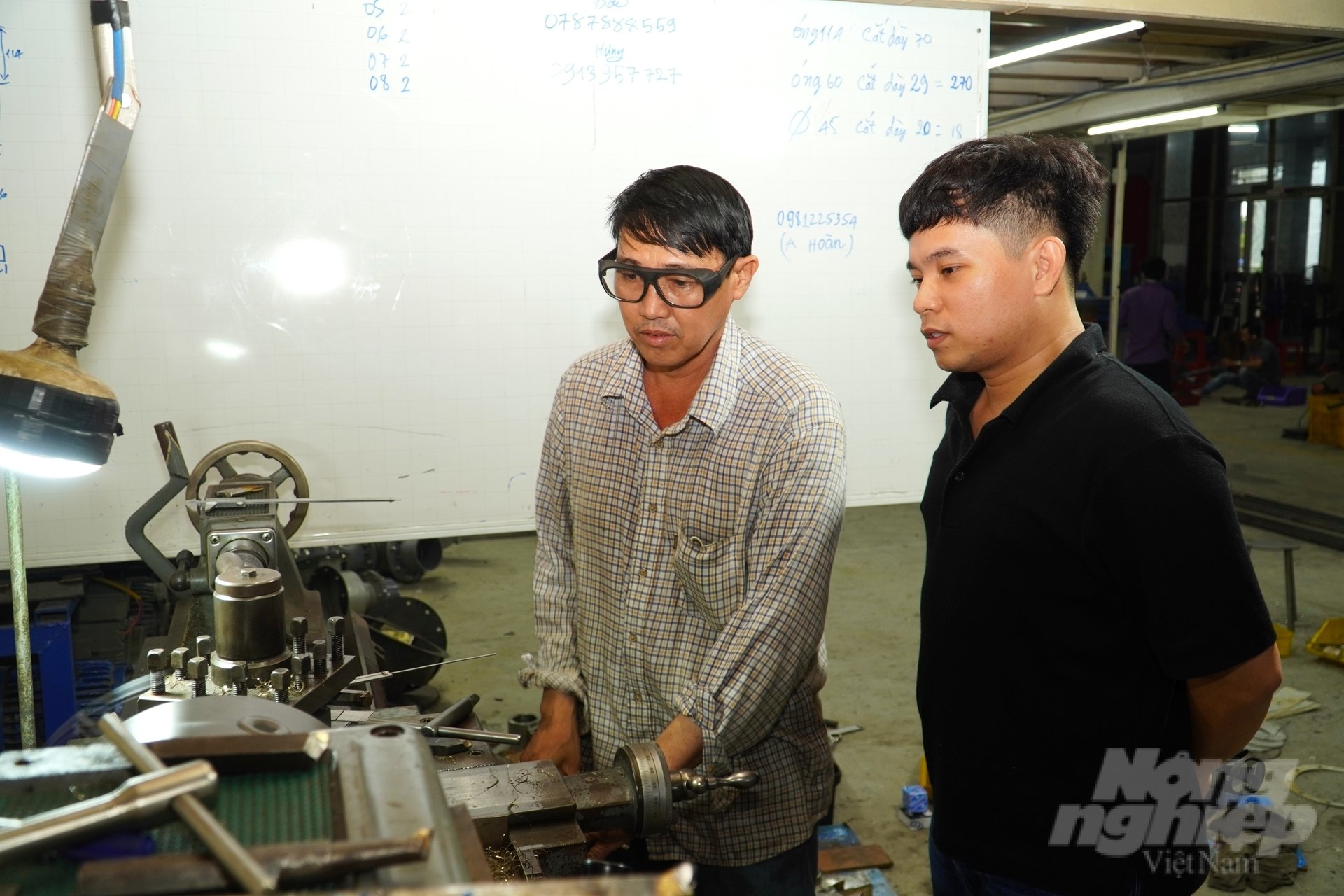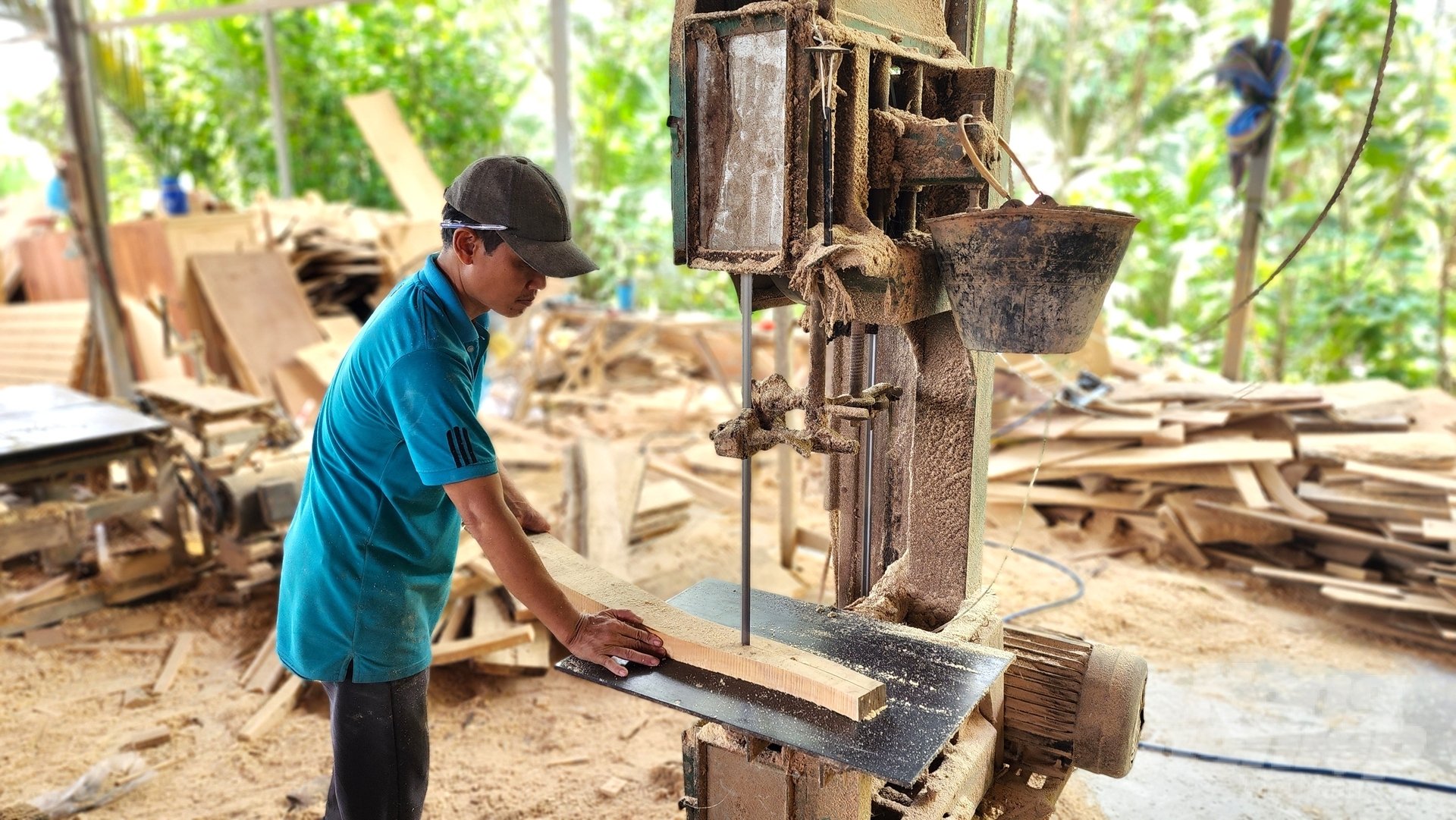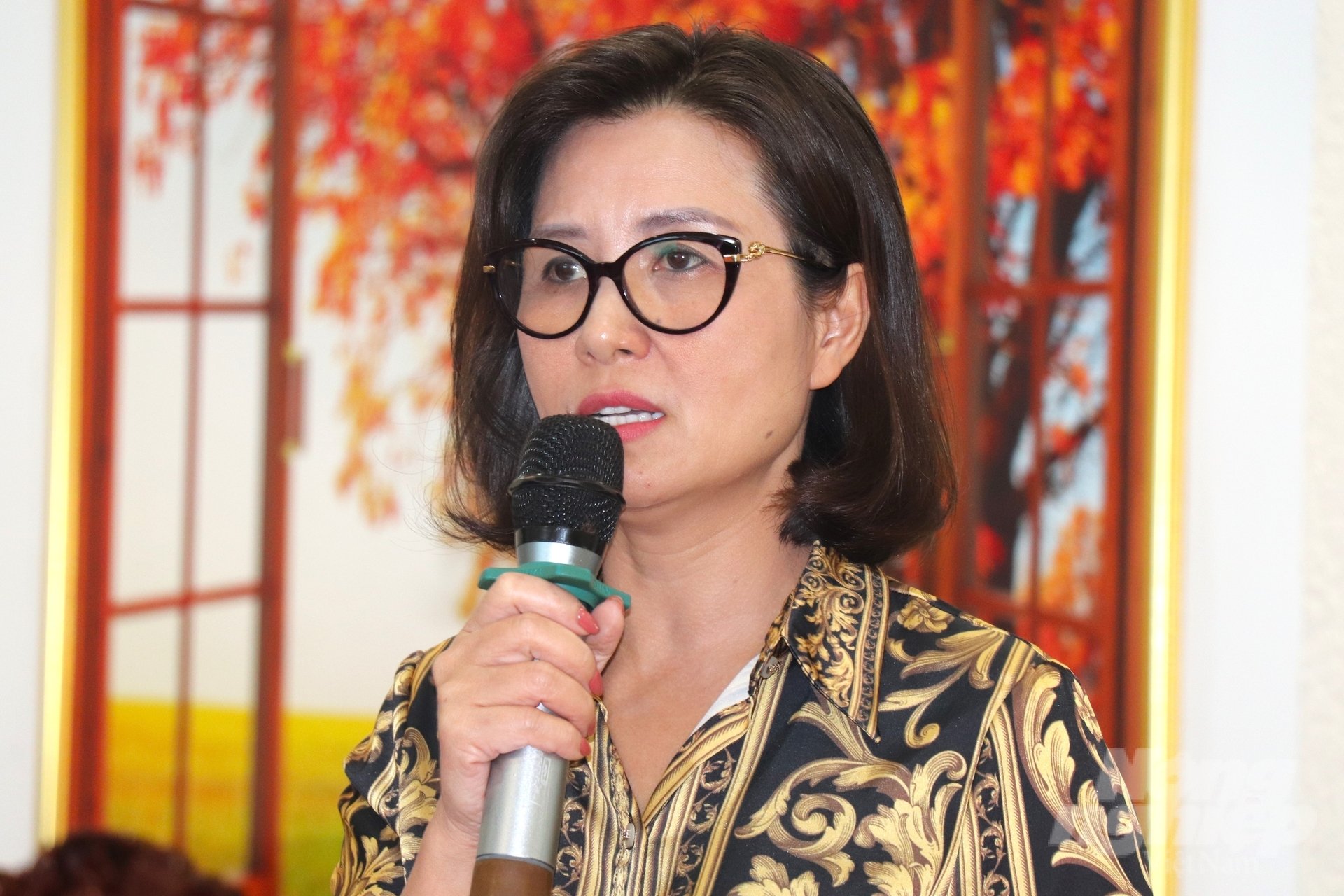May 30, 2025 | 12:26 GMT +7
May 30, 2025 | 12:26 GMT +7
Hotline: 0913.378.918
May 30, 2025 | 12:26 GMT +7
Hotline: 0913.378.918
The Mekong Delta region possesses advantages for developing diversified agricultural commodities to meet market demands both domestically and internationally, thereby generating livelihoods for 33% of the region's workforce. In recent times, the skill level of the workforce and training in the region has improved, with the proportion of trained labor increasing from 12% (in 2016) to 15% (in 2021).

Workers at Farmx.vn Company Limited, which produces automated machines for shrimp feed in Ca Mau province. Photo: Kim Anh.
However, in reality, the labor force in the Mekong Delta region is facing numerous challenges, such as the natural labor transition causing an imbalance in production resources, low labor skill levels with a tendency towards aging, insufficient employment leading to low labor productivity and income. The low skill level of the workforce, coupled with an underdeveloped vocational education system in terms of quantity and quality, exacerbates the situation. Particularly, the lack of linkage between training institutions and labor-utilizing units has resulted in suboptimal training effectiveness.
Meanwhile, following the new development orientation of the Mekong Delta region, there's a demand for economic development in agriculture, high-tech agriculture, ecology, large-scale and high-quality commodity production. Especially, agriculture integrated with commerce, logistics services, tourism, and value-added processing industries to enhance competitiveness. Therefore, there's a requirement for a high-quality labor force and appropriate vocations for agricultural and rural labor.
Recently, the Department of Economic Cooperation and Rural Development (Ministry of Agriculture and Rural Development) organized a workshop to discuss the current situation and training directions for vocational conversion for agricultural and rural labor in the Mekong Delta region by 2030.
During the workshop, representatives from several localities in the Mekong Delta region expressed concerns about issues such as vocational training certification, vocational training curriculum, teaching equipment, and the adequacy of the teacher workforce. They also highlighted the need for policies to encourage and support rural labor to participate in vocational training and enhance knowledge to serve production. For example, the reality of some Continuing Education Centers and district-level Vocational Training Centers in Tra Vinh province showed that training for farmers is quite limited, mainly focused on theoretical teaching.
Mr. Luu Phan Thinh, Deputy Head of the Department of Rural Development in Bac Lieu province, raised concerns that in the past, teaching staff in some Vocational Training Centers mostly focused on agricultural production techniques, neglecting fields like machinery repair and processing. Therefore, Mr. Thinh suggested that this area should be supplemented in the Vocational Training and Conversion Project for agricultural and rural labor in the Mekong Delta region by 2030.

Representatives from some localities propose policies to encourage entrepreneurship and attract young people to develop in the field of agriculture. Photo: Kim Anh.
In particular, to attract rural labor to participate in vocational training, Mrs. Nguyen Thi My Hung, Deputy Head of the Department of Rural Development in Dong Thap province, believes that there should be priority policies to encourage vocational conversion for rural labor, especially for those transitioning directly from agricultural production to other industries. Mrs. Hung evaluates that the level of vocational training support is very low, mainly providing allowances for meals and transportation, which does not create sufficient motivation to attract rural labor to participate.
In addition, in Dong Thap province, there is also the issue of an aging rural labor force participating in vocational training. The majority of individuals who want to learn vocations are older than the training age limit, so they do not receive vocational certificates; they primarily participate to update their knowledge.
Through the Vocational Training and Conversion Project for agricultural and rural labor in the Mekong Delta region by 2030, Mrs. Hung hopes for adjustments to create policies that attract young labor. Furthermore, the project needs to call for the participation of labor-utilizing units such as businesses, cooperatives, and collaborative groups to work with training institutions to order labor according to appropriate vocational fields that match market demands.
Agreeing with this viewpoint, Mr. Nguyen Quoc Phong, Director of the Department of Rural Development in Vinh Long province, stated that currently, it is difficult to find individuals suitable for vocational training for rural labor. Some trained labor lacks the capital to develop the models and industries they were trained in. In some cases, in Vinh Long, trained labor can be hesitant to borrow from banks to start economic activities due to a lack of understanding of the knowledge they were taught. Mr. Phong believes that the quality of training has not truly yielded effective results, causing learners to lack the confidence to participate.
Mr. Phong proposed policies to encourage entrepreneurship and attract young people to develop in the field of agriculture, stating that this is the way to meet quality requirements.
Considering the specific and practical contributions of localities, Mrs. Nguyen Thi Hoang Yen, Deputy Director of the Department of Economic Cooperation and Rural Development, recognizes that reaching the target labor group is a challenging task. Therefore, in the Vocational Training and Conversion Project for agricultural and rural labor in the Mekong Delta region.

Mrs. Nguyen Thi Hoang Yen, Deputy Director of the Department of Economic Cooperation and Rural Development, acknowledges that reaching the target labor group is a challenging task. Photo: Kim Anh.
In the Mekong Delta region by 2030, when developing training programs, they must be aligned with practicality to guide farmers towards professionalism.
Understanding that the farming community is already quite proficient in production, what they need training in is how to organize production, how to perceive the market, and how to manage… In the past, vocational training, especially at the basic level or under 3 months, focused mainly on technical aspects, and farmers have done very well. Therefore, in the Vocational Training and Conversion Project for agricultural and rural labor in the Mekong Delta region by 2030, the Department of Economic Cooperation and Rural Development aims for diverse training methods, emphasizing less theory, and introducing farmers to digital agriculture.
The draft project outlines 4 main tasks for the Vocational Training and Conversion Project for agricultural and rural labor in the Mekong Delta region by 2030. The focal points are:
Training, workshops, and capacity-building to enhance knowledge for 440,000 laborers in the region specialized in rice, aquaculture, and fruit production, serving green growth and climate change adaptation, forming a professional farming workforce.
Providing vocational training for 1 million laborers trending towards transitioning from direct agricultural production (farming, livestock, aquaculture) to agricultural service sectors, processing in agriculture, forestry, aquaculture, other fields, and vice versa.
Enhancing skill training for 60,000 laborers working in agricultural, forestry, and aquaculture factories.
Providing vocational training to enhance the capabilities of 3,500 managerial officers and cooperative members in the Mekong Delta region.
Translated by Nguyen Hai Long
/2025/05/25/4127-3-073637_820.jpg)
(VAN) Thanks to the promotion from an FAO-implemented project, vegetable production in greenhouses in Moc Chau has seen strong development, from 1.5 hectares in 2021 to nearly 50 hectares in 2024.

(VAN) FAO has recently supported USD 140,000 to implement the project 'Risk mitigation human-animal interface risks through disease control initiatives in pig farming.'

(VAN) The People's Committee of Tra Vinh province has approved an adjustment to the investment policy for the Green Hydrogen Plant project, increasing its area to approximately 52.76 hectares.
![Reducing emissions from rice fields: [2] Farmers’ commitment to the soil](https://t.ex-cdn.com/nongnghiepmoitruong.vn/608w/files/news/2025/05/05/dsc08881jpg-nongnghiep-140632.jpg)
(VAN) Clean rice cultivation model in Thuong Tan commune, Bac Tan Uyen district, is assisting local residents in achieving sustainable agriculture by substantially reducing costs, increasing productivity, and protecting the environment.

(VAN) At the conference to disseminate Resolution No. 68, AgriS introduced its digital agricultural ecosystem and reaffirmed its commitment to accompanying the Government in promoting private sector development and sustainable agriculture.

(VAN) 'Blue Ocean - Blue Foods' initiative is designed to restore marine ecosystems and establish sustainable livelihoods for local communities by cultivating a minimum of 1,000 hectares of cottonii seaweed in the first three years.
/2025/05/21/4642-3-112707_603.jpg)
(VAN) The V-SCOPE project has made direct contributions to three out of six pillars of the Comprehensive Strategic Partnership between Vietnam and Australia.